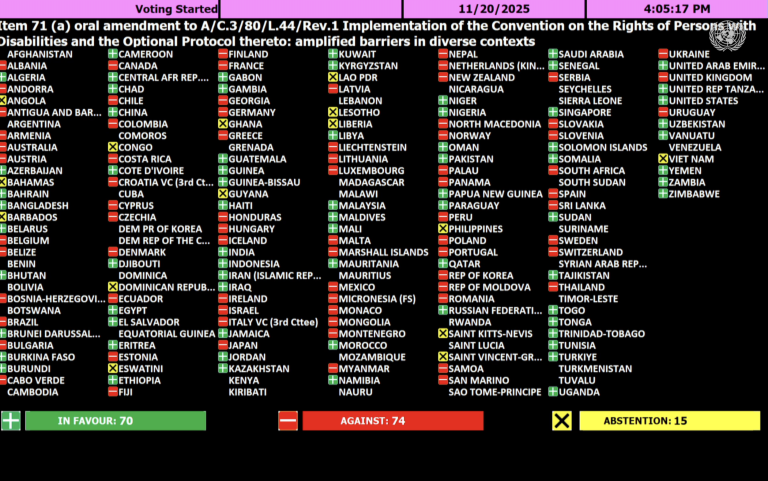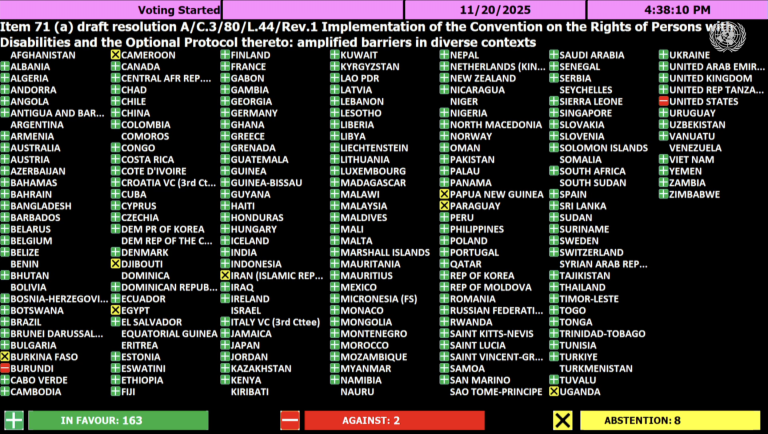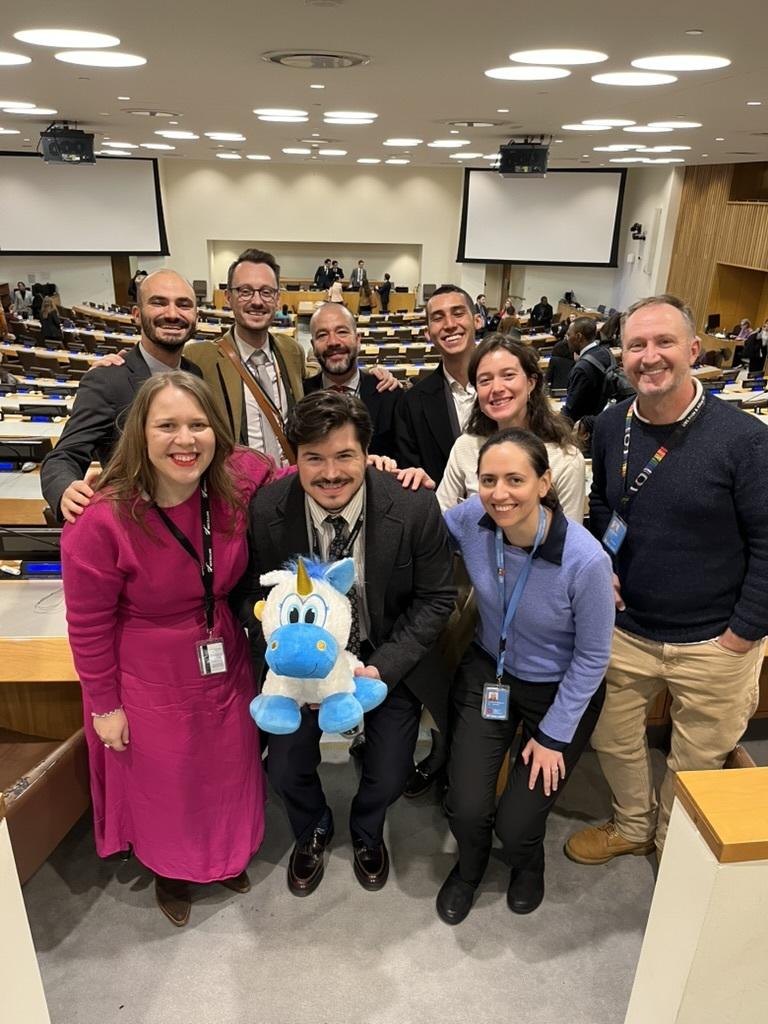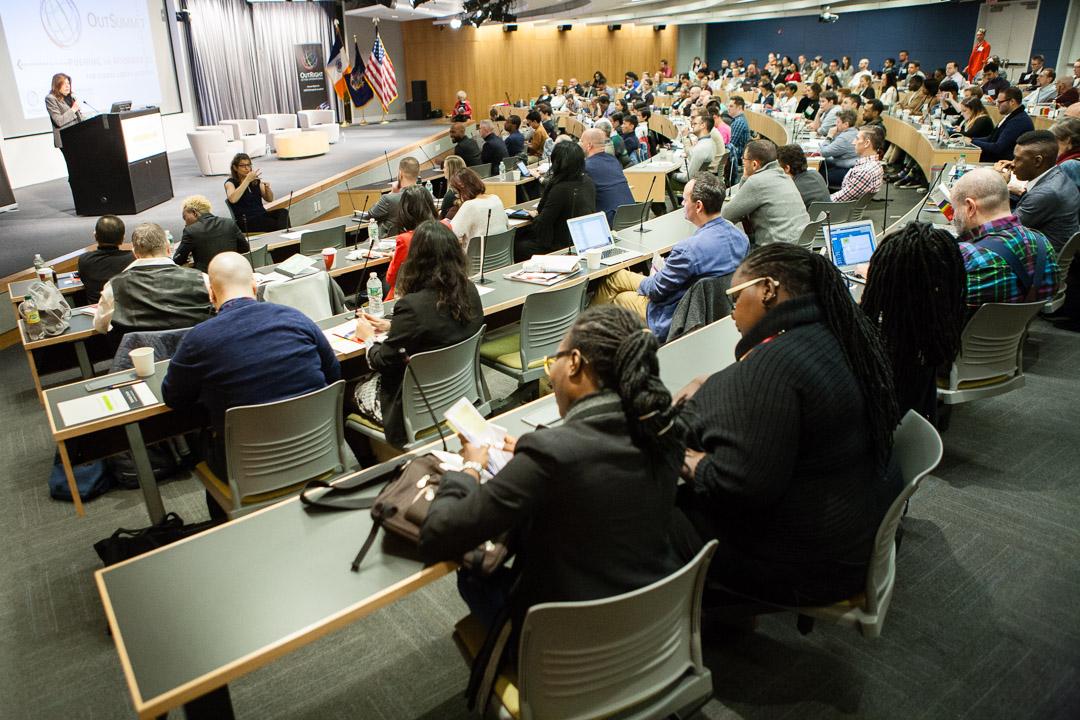
Press Release
UN Takes Historic Stand: Disability Rights Resolution Affirms Protections for LGBTQ+ People
Region(s)
TOPIC(s)
Publish Date
November 21, 2025
Authors
Third Committee vote marks only the third time LGBTQ+ protections appear in a UN General Assembly resolution.
In a landmark move, the United Nations has passed a disability rights resolution that—for the first time —explicitly recognizes that persons with disabilities face discrimination based on their sexual orientation or gender identity. During negotiations, an attempt to delete the reference to “sexual orientation and gender identity” failed in a tight vote—74 States opposed the amendment and 70 supported it.
Adopted on 20th November 2025 by the UN General Assembly’s Third Committee, the resolution was championed by Mexico and New Zealand and received strong cross-regional support. Its message is clear: disability rights cannot be fully realized unless all forms of discrimination, including those faced by LGBTQ+ people, are addressed.
Why This Matters
This resolution highlights that persons with disabilities experience amplified barriers when disability interacts with diverse contexts, one of which is discrimination on the basis of sexual orientation and gender identity. Persons with disabilities often experience additional barriers when poverty, conflict, displacement, climate change, or discrimination intersect with their daily lives. For LGBTQ+ persons with disabilities, these challenges can be even more severe— from violence and forced institutionalization to denial of healthcare, education, and employment.
The vote comes amid a global increase in efforts to roll back LGBTQ+ protections, making the UN’s move especially significant.
The new resolution acknowledges these real-world harms and reinforces that governments must eliminate discriminatory laws, improve accessibility, and ensure that persons with disabilities can fully participate in their communities on an equal basis with others.
Disability groups worked hard to ensure the resolution—whose theme was “amplified barriers in diverse contexts”—reflects that disability-related exclusion is shaped by many overlapping factors and different local realities. They also fought to ensure that the resolution explicitly recognized the amplified barriers faced by LGBTQ+ persons with disabilities. by urging States to include language on “sexual orientation and gender identity.” Diverse contexts can intensify nearly every barrier to equality, and LGBTQ+ persons with disabilities are part of the world’s rich diversity.
Hard-Fought Language Stays In
During a two-hour debate on the resolution, a group of governments led by Egypt sought to delete the reference to “sexual orientation and gender identity”. Their amendment—which would have singled out LGBTQ+ people as uniquely undeserving of human rights protections—was put to a vote.
Member States held the line. The amendment failed in a tight vote, with 74 countries opposing Egypt’s proposal and 70 supporting it. Another 49 abstained or did not vote. As a result, the reference to “sexual orientation and gender identity” remained—marking only the third time such language has appeared in a General Assembly Third Committee resolution.

(Vote on Egypt’s amendment to delete “sexual orientation and gender identity”)
The overall resolution then passed with overwhelming support: 163 States in favor, only 2 against, and 28 abstaining or not voting.

(Vote on final resolution (including the language “sexual orientation and gender identity”)
Many States also spoke up in favour and some against and the full proceedings are worth watching.
A Win for Inclusion
Outright International and its partners have long documented how LGBTQ+ persons with disabilities face heightened risks—from forced medical procedures to barriers accessing sexual and reproductive health services. UN human rights experts agree that these overlapping forms of discrimination remain widespread and insufficiently addressed.
Today’s resolution is a direct response—recognizing these realities and urging governments worldwide to act.
Next Step: Turn Words Into Action
Human rights advocates are calling on governments to implement the resolution by removing discriminatory laws, expanding accessible services, protecting LGBTQ+ persons with disabilities from violence and harmful practices, and supporting human rights defenders. We call on States to take concrete actions in-line with their obligations under the CRPD and international standards to dismantle the barriers faced by persons with disabilities in diverse contexts.
This historic vote sends a powerful message: disability rights and LGBTQ+ rights are inseparable—and protecting both is essential for building a more inclusive world.
Quote from Maria Sjödin (they/she)
“Today’s vote is more than a procedural win—it is a recognition of people whose lives are too often pushed to the margins,” said Maria Sjödin, Executive Director of Outright International. “For the first time, the UN has affirmed that disability and LGBTQ+ rights are deeply connected. This is a milestone worth celebrating, but it is also a call to action. Governments must now turn these words into real change—by removing discriminatory laws, investing in accessible services, and ensuring that LGBTQ+ people with disabilities can live with dignity and equality, everywhere.”

(Representatives from Mexico and New Zealand (Co-facilitators of the resolution), Chile and the Kingdom of the Netherlands (Co-chairs of the UN LGBTI Core Group), and Outright International and the International Disability Alliance after the historic vote!)

Read Our Publications
Since 1990, we have partnered with activists from all over the world to produce hundreds of groundbreaking reports.
Learn More